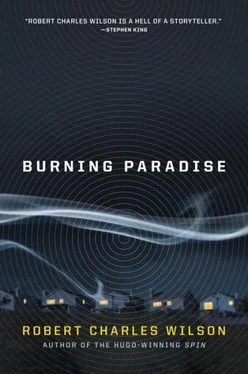Leo’s car was an old Ford, its brown paint bubbled with rust. It was probably older than Thomas, but it was the best transportation Leo could afford on the money he made at the restaurant where he worked nights. His father, though famously wealthy, hadn’t set him up with a fancy income. But as of now, Cassie thought, Leo had spent his last day bussing tables at Julio’s. She heaved her suitcase and Thomas’s into the empty trunk of the car, next to Beth and Leo’s few things, then slid into the backseat with Thomas.
“So where are we going?” Beth asked.
It was a good question. Cassie waited to hear the answer. Sooner or later she would have to ask herself the same thing.
“First stop, your place. See if your father’s okay. What we do then depends on what we find.”
Ten Society families had fled to Buffalo after the massacre. Most had been associated with (or had lost loved ones associated with) Harvard, the Massachusetts Institute of Technology, or UMass. Aunt Ris had known them all socially, and it was she who had organized the exodus.
All those families had sustained attacks. All were grieving for lost husbands or fathers, mothers or wives. Wisely, they had been unwilling to go on living in the homes where their loved ones had been killed. They may not have been in immediate danger—the attacks had been narrowly targeted at active members of the Society—but they had been made exquisitely aware of their vulnerability. The last generally-distributed Society document (a letter to survivors from Werner Beck) had been laced with dire warnings and tips on preserving anonymity.
There were other such enclaves of survivors around the country and elsewhere in the world. Only a shadow of the old Correspondence Society still existed, but the emotional and occasional financial support it provided had been invaluable. Survivor gatherings were the only occasions when grief and anger that had to remain hidden from strangers could be openly expressed and understood.
But the need for secrecy was always corrosive, especially for the children of such families. Cassie and Thomas fell into that category. So did Leo and Beth.
School, for instance. Cassie had attended Millard Fillmore Secondary School until her graduation last year, and every day had brought some sharp reminder that she was an outsider only passing for normal, a refugee from a different and darker country. History classes had been a particular torment. Before the massacres of 2007, she had been allowed by her parents to believe the narrative of technological and social progress the textbooks loved to portray: the discovery of the radio-propagative layer above the Earth’s atmosphere (the so-called radiosphere) in the 1890s, the Great War and its aftermath, the abolition of segregation in the U.S. in the 1930s, the European and Eurasian peace pacts, the gender liberation of the 1950s… above all, the comforting near-certainty that the world was every day a little wealthier and a little more just. It was only after the death of her parents that Cassie had been introduced to the real truth: that there was an invisible hand at work in human history, indifferent despite its apparent benevolence, often cruel, occasionally murderous.
That knowledge had set her apart from her classmates. Her few friendships were really just temporary alliances with other social outsiders—with Annie Jessup, for instance, who wore a stainless-steel leg brace; with Patrice Kossuth, who stuttered uncontrollably on the rare occasions when she attempted to speak. And what good was friendship when Cassie was obliged to conceal so much about herself? The only people of Cassie’s age to whom she could truly unburden herself were the children of the Society, who all had stories like hers and whose sympathy was therefore generic and often insincere.
Despite all that, she had methodically planned a future for herself. Since she left high school she had been working as a counter clerk at a Main Street department store called Lassiter’s, saving tuition and book fees for a semester at NYU. Her ambition had been to take a biology major that would ultimately allow her to focus on the study of invertebrates: her uncle’s career and his books on entomology had been an obvious inspiration. She would get a post-graduate degree, maybe end up teaching at some regional college; she would lead a quiet but useful life and make a modest contribution to the sum of human knowledge. She had imagined herself living in a book-lined room on a tree-lined campus, with a window through which she could watch the seasons change. She would be alone, perhaps, but she would also be contented, useful, safe.
It was a stupid delusion, and she blushed at the thought of it. Because now the green-on-the-inside men had come back, and there would be no sheltered room, no window from which to watch the winter snow. The events of the last few hours meant she would lead the rest of her life in strict anonymity, perhaps under an assumed name, taking the sort of jobs that required no experience or documentation, probably living in a sequence of rented apartments in a sequence of obscure towns. And the same, she realized with belated anguish, would be true of Thomas.
Thomas put his head against her shoulder and closed his eyes. The motion of the car and the emotional overload of the morning had made him sleepy. That was a blessing, Cassie thought. She stroked his hair and let him doze.
Leo drove with an eye on the rearview mirror, making sure they weren’t being followed. The route to Beth’s place took them across town through thickening traffic. Cassie spared a thought for Beth, sitting pale and silent in the passenger seat up front. Cassie had always felt a cordial dislike for Beth, richly reciprocated, but they were in the same boat now.
“If my father—I mean,” Beth said, “if he’s not home—if we can’t find him—where do we go after this?”
“Depends,” Leo said.
“Because even if he is home, I don’t want to stay with him. We had this discussion once, what to do if the sims come back. He has fake ID for both of us and he says he has enough cash to keep us in some little place, maybe Florida—but I don’t want to live in fucking Florida! I don’t want to live with him anywhere .”
“Okay,” Leo said gently. “It’s up to you. What ever happens. But if he’s home, we need to warn him.”
“So where are you going?”
“West.”
“Where west?”
“To where my own father lives.”
Leo’s father: Werner Beck, patron of the Correspondence Society
and the closest thing to a leader the fractious and disorganized Society had ever had. Famously intelligent, famously well-organized, and famously difficult to deal with. Cassie had once heard Aunt Ris describe Werner Beck as “a smart man, but a classic authoritarian.”
They left the parkway for a neighborhood of tall apartment buildings much nicer than Leo’s low-rise. Cassie caught a glimpse of Beth’s face in the rearview mirror, now a mask of silent apprehension.
The Society kids in Cassie’s circle had given each other nicknames. Cassie was “Raccoon,” probably for the way her eyes looked after a typical sleepless night. Beth when she was younger had been “Angel,” but lately she had been called meaner and more explicit names. She had gone out with a lot of guys in school, mostly of the leather-jacket-and-flick-knife persuasion. Leo himself had credentials with that crowd… though, by Beth’s standards, Leo constituted a step toward respectability. Cassie had tried to ignore all that talk.
No angel could have looked as terrified as Beth did now. At the first sight of flashing red lights a few blocks away she went rigid.
And so did Cassie. Cassie had been harboring an unexpressed hope that they would find Beth’s father safe at home, that the death of the sim on Liberty Street had been a weird anomaly, that Aunt Ris was therefore also safe, that a semblance of sanity or at least continuity would be restored to her life….
Читать дальше










